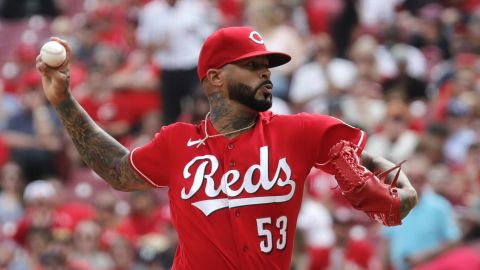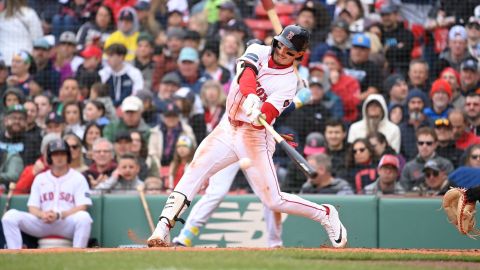Stop me if you've heard this before. A highly regarded Japanese pitcher who's pitched in the Olympics and the World Baseball Classic could be joining the majors during the offseason, bringing with him a hefty price tag — with a lot of the money going to the pitcher's current team as a posting fee.
No, this isn't the 2006-07 offseason all over again. But we could be in for an eerily similar scene, and Yu Darvish is starring as Daisuke Matsuzaka.
It's still unclear whether Darvish will make the jump to Major League Baseball, but it's been believed since 2010 that 2012 is a logical arrival time, meaning the young phenom's name will inevitably be tossed around throughout this offseason.
There's also no indication at this moment that the Red Sox are interested in the 25-year-old right-hander's services. But considering the Sox' projected 2012 starting rotation has some question marks, especially after the 2011 version's collapse down the stretch, it's difficult to imagine them not kicking the tires on Darvish if and when he decides he's going to try his hand in America. The team's recent rolls of the dice (no pun intended) when it comes to Japanese imports (Daisuke Matsuzaka, Hideki Okajima, Junichi Tazawa) also suggest that the Sox are probably a team we shouldn't rule out of the Darvish sweepstakes.
But as unclear as the whole potential Darvish fervor still is right now, it's abundantly clear the Sox would be wise to steer clear of the Japanese hurler if he does decide to pitch in the majors next season.
Not only has it been speculated that the total price to obtain Darvish could reach $100 million or more, but history isn't exactly on the right-hander's side, either.
Matsuzaka's tumultuous career with the Sox is well-documented, but he's not the only Japanese "ace" to falter upon joining the MLB recently. Matsuzaka (six years, $103 million), Kei Igawa (five years, $46 million) and Kenshin Kawakami (three years, $23 million) have all struggled despite earning substantial paydays based on the hype surrounding them upon their exit from Japan.
None of those pitchers have been selected to an All-Star Game in their careers. In fact, Japanese-born pitchers have only made six All-Star appearances ever – Kazuhiro Sasaki was named to the AL team in 2001 and 2002, and Hideo Nomo (1995), Shigetoshi Hasegawa (2003), Okajima (2007) and Takashi Saito (2007) have all been selected once.
Now to discredit Darvish's potential because of the accomplishments — or lack thereof — of other Japanese pitching prospects wouldn't be fair. It would be a complete generalization and would seriously undermine the skill set that's made him a fantastic pitcher in the Pacific League of Nippon Professional Baseball.
But the fact remains: Japan's major league is much different than Major League Baseball, particularly the culture and the way in which player's prepare. If Darvish were to live up to expectations, he'd be the exception rather than the rule based on history. The trend of Japanese pitchers not seeing their success in Japan translate into success in America is just too alarming to gamble potentially $100 million — especially if you're a team that doesn't generally shell out big contracts.
And while that probably isn't much of a concern for the Red Sox, as they're coming off perhaps the biggest offseason spending spree in team history in 2010-11, they still have the talent level to succeed without needing to completely open up their checkbooks. Instead, the team should allocate its efforts to focus on internal issues — such as who is going to be managing come Opening Day.
If, after that, the Sox decide to go after pitching via free agency in an effort to improve, there are other lower-risk options that should be considered before making a play at a big fish like Darvish, including Edwin Jackson, Rich Harden, Joel Pineiro and Jason Marquis. The Texas Rangers' C.J. Wilson is also set to become an unrestricted free agent for teams looking to obtain a top-of-the-rotation starter, although his price should exceed Darvish's.
Darvish could become a fine major league pitcher — a bona fide ace, perhaps. After all, he exceled in the 2009 World Baseball Classic and has a 91-36 record to go along with an impressive 2.04 ERA in his career with Japan's Nippon Ham Fighters. He's also coming off his best season as a pro, matching a career-high with 16 wins and compiling a career-high 1.54 ERA in 175 innings.
All are fantastic statistics, except that last number.
Darvish already has seven full seasons to his credit in Japan, tossing over 200 innings in three of them. He's been pitching since 2005, when he was just 18 years old.
As Matthias Koster of the blog Mop-Up Duty points out, Darvish threw 140 or more pitches nine times in 2010. In the majors, a pitcher only topped the 140-pitch mark once, which was Jackson's 149-pitch no-hitter. Darvish even had back-to-back outings during which he threw 156 and 150 pitches.
For the season, Koster reports that Darvish averaged about 128 pitches per start.
These pitch counts are common across Japanese baseball, as Matsuzaka also reached pitch counts in Japan that were much higher than those he's been limited to in the majors. Japanese pitchers are on a different type of throwing regimen, often receiving an additional two or more days between starts than they typically would in a Major League rotation. But while one would believe this might alleviate some concerns about Darvish's arm going forward, Matsuzaka's strikingly similar career path raises a red flag.
Matsuzaka has never fully embraced a typical major league starter throwing regimen with the Sox. He often disagreed with the organization on how much and how often he should throw between starts. In Japan, he was accustomed to throwing long toss and bullpen sessions on the same day, which is a habit the Sox broke upon his arrival. Darvish would also be expected to break his current routine, likely by any team he lands with, which could have adverse effects.
There's no denying the talent that Darvish has, but when everything is taken into account as a package, it's difficult to imagine why one would want to dish out a large sum of cash to the young phenom.
He could prove me and everyone else wrong. But if I were an MLB GM, I'd just as soon watch him do it for another team, because the risk far outweighs the reward.




